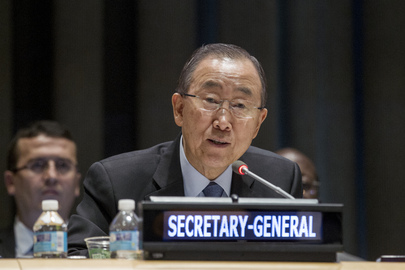Ethiopia urged to protect citizens’ rights during state of emergency
By Tesfa-Alem Tekle
October 20, 2016 (ADDIS ABABA) – The United Nations Secretary-General, Ban Ki-moon has urged the Ethiopian government to ensure “the protection of fundamental human rights” during the imposed six-months long state of emergency.

Effective from 8 October, the Ethiopian government imposed a state of emergency in the wake of continued anti-government protests across its Oromia region.
The state emergency imposed for first time after over quarter a century, includes shut down to internet access and ban on all social Medias which had been major tools to organize protests in Oromia and Amhara region
The do’s and don’ts also include travel restrictions on diplomats, ban on any contact with groups that are labeled as “terrorist.”
It bans exchange of messages through social Medias or mobile phones. Publishing news or distributing documents of opposition movements branded as terrorist entities is also prohibited.
A dusk-to-dawn curfew has also been imposed around areas where factories and major projects are located.
The UN spokesman, Stephane Dujarric on Monday said that Ban has been following developments in Ethiopia “with concern” since the state of emergency was declared.
Ethiopia’s largest ethnic group, the Oromo, began protesting almost a year ago demanding wider democratic and economic rights.
According to human rights groups and opposition activists, an estimated 500 people have been killed during months-long anti-government protests in the Amhara and Oromia regions.
Amnesty International on Tuesday said more than 800 protesters have been killed this month.
Dujarric said Ban “reiterates his call for calm and restraint and calls for inclusive dialogue to resolve all grievances.”
According to a mayor of a town outside Ethiopia’s capital 1,000 protesters have been arrested this month following the renewed violence.
Sebeta town mayor, Ararsa Merdesa, told the Associated Press that some of the 1,000 people arrested were released, but many remain detained and are under investigation.
Ararsa said only 50 of those arrested were locals and the rest came “to cause the violence.” He said dozen of factories and vehicles were burnt during the violence.
The latest violence erupted after 55 people were killed in a stampede when police tried to disperse protesters during a religious festival in the Oromia region.
The latest developments have drawn concern by international bodies including the United Nations and the European Union has called on the Ethiopian government to engage in dialogue with protesters.
Amnesty international said heavy-handed measures by the Ethiopian government will only escalate a deepening crisis.
The caution comes as the government issued a directive imposing wide-ranging restrictions as part of a state of emergency.
“These emergency measures are extremely severe and so broad that they threaten basic human rights that must not be curtailed even under a state of emergency,” said Muthoni Wanyeki, Amnesty International’s Regional Director for East Africa, the Horn and the Great Lakes.
“These measures will deepen, not mitigate, the underlying causes of the sustained protests we have seen throughout the year, which have been driven by deep-seated human rights grievances. These grievances must be properly addressed by the authorities. Further crackdowns and human rights violations will only make the situation worse.”
In a public statement issued today, Amnesty International recommends that instead of further curtailing human rights, the government should seize the moment and recommit itself to respecting, protecting and fulfilling them, in line with its regional and international obligations.
“It is the government’s failure to constructively engage with the protesters that continues to fuel these protests. It must now change course,” said Muthoni Wanyeki.
“The government must ensure an end to excessive and arbitrary use of force by the security forces against demonstrators and release all protesters, opposition leaders and supporters, as well as journalists and bloggers, arrested for exercising their rights to freedom of expression, association and peaceful assembly,” she added.
(ST)
